Amazing what you find in your Inbox. I find it to be a continuing source of synchronicity. Here I am, staring at my site statistics page, contemplating all the usual viral marketing methods. Are they genuinely effective at reaching mass audiences in a cloistered, disaffected age such as ours? How does one put butts in seats when everyone seems content to isolate themselves into provincial, mutually-antagonistic sub-cultures?
Pondering all this, I stumble across a bit of spam from Franklin, Indiana’s own B Movie Celebration. Among the heads highlighted on their Spotlight page, I found the life story of one Howard W. “Kroger” Babb. Born in Lees Creek, Ohio, 1906, Babb earned his nickname working at a grocery story. He fell in with Cox and Underwood, those legendary roadshow movie makers, at some time in the 30s, and cut his teeth in 1938 shilling a best-forgotten portrait of Ozarks Mountain life called Child Bride . With Child Bride, Babb combined the usual exploitation tactic of aping a salacious film’s “educational” value with an old fashioned, Midwestern, carny barker’s style. This generated far more denero than a no-budget morality play about hicks who marry underage girls (staring a twelve-year-old Shirley Mills, two years out from her role in The Grapes of Wrath) would seem to warrant.
Child Bride‘s trailer showcases Babb’s early work. Incidentally, Babb met his wife during the film’s distribution, who later in life described the film as “the most atrocious thing I ever saw”. {More}


 I’ll be honest with you: I never gave a toss about the Fantastic Four. I know that’s heresy to a certain number of nerds and I don’t care. Their family comradeship, good natured bickering, and overriding message of wholesomeness never sat well with me. Like Pizza Hut pizza, its initial beguiling flavor disguises stomach-churning ookiness. Leave it to Hollywood to pick out the Four’s most nausea-inducing elements and assemble them into an annoyingly bland film.
I’ll be honest with you: I never gave a toss about the Fantastic Four. I know that’s heresy to a certain number of nerds and I don’t care. Their family comradeship, good natured bickering, and overriding message of wholesomeness never sat well with me. Like Pizza Hut pizza, its initial beguiling flavor disguises stomach-churning ookiness. Leave it to Hollywood to pick out the Four’s most nausea-inducing elements and assemble them into an annoyingly bland film.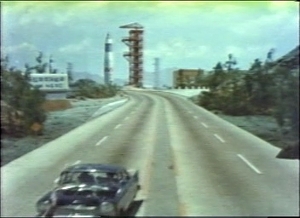 We open at a wedding as the bride and groom depart in their shark-faced car, a gleaming phallic rocket wishing them well from the background. Must be the late-1960s, and this must be Korea’s answer to Godzilla and Gamera‘s breakaway success. This is Yongary, a Sino-Korean co-production conceived with the land beyond the sea (the East Sea, that is) firmly in mind. Thus Yongary‘s many, many problems. All of which are accentuated by a horrible dubbing job and an injudicious use of TV aspect ratios.
We open at a wedding as the bride and groom depart in their shark-faced car, a gleaming phallic rocket wishing them well from the background. Must be the late-1960s, and this must be Korea’s answer to Godzilla and Gamera‘s breakaway success. This is Yongary, a Sino-Korean co-production conceived with the land beyond the sea (the East Sea, that is) firmly in mind. Thus Yongary‘s many, many problems. All of which are accentuated by a horrible dubbing job and an injudicious use of TV aspect ratios.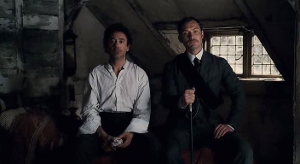 I could care less about Robert Downey Jr.’s personal reformation into an Action Hero and franchise flagbearer. He must be doing something right, though damned if I can find two movie critics who’ll agree on just what that is. Most dismissed his turn as Sherlock Holmes, and dismissed this film as a bit of mindless fluff meant to tide us over until Iron Man 2. Read Rotten Tomatoes and you’ll find this film suffers from the usual consensus: it’s a bit of fun, sure, but in no sense civilized. And it ruined Sherlock Holmes.
I could care less about Robert Downey Jr.’s personal reformation into an Action Hero and franchise flagbearer. He must be doing something right, though damned if I can find two movie critics who’ll agree on just what that is. Most dismissed his turn as Sherlock Holmes, and dismissed this film as a bit of mindless fluff meant to tide us over until Iron Man 2. Read Rotten Tomatoes and you’ll find this film suffers from the usual consensus: it’s a bit of fun, sure, but in no sense civilized. And it ruined Sherlock Holmes.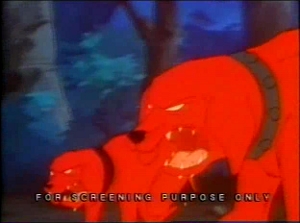 If you’re at all like me you probably wasted most of your childhood watching Super Sentai: imported, live-action, Japanese superhero shows, repackaged for American audiences. The most famous examples were brought to America’s shores by the Egyptian-born warhawk Haim Saban, but he is only the tip of a good-sized professional iceberg. As anyone who’s seen Prince of Space knows, Japanese superhero shows have not moved along all that much since the 1950s, and neither has the process of Westernizing them.
If you’re at all like me you probably wasted most of your childhood watching Super Sentai: imported, live-action, Japanese superhero shows, repackaged for American audiences. The most famous examples were brought to America’s shores by the Egyptian-born warhawk Haim Saban, but he is only the tip of a good-sized professional iceberg. As anyone who’s seen Prince of Space knows, Japanese superhero shows have not moved along all that much since the 1950s, and neither has the process of Westernizing them.
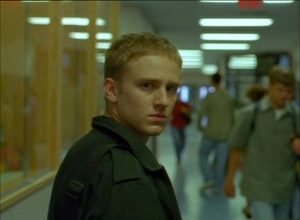 The writers/directors of Duck! The Carbine High Massacre warned us this would happen. Bang Bang You’re Dead is just the “‘made for TV’ movie” the opening title card for their little school-centric rampage picture warned us about. Based on the one act play of the same name by Eugene, Oregon resident William Mastrosimone, Bang Bang You’re Dead attempts to combine the maudlin sentimentality of an ABC After School Special (and, in fact, won a Daytime Emmy Award for its apparent success at just that) with a bit of social realism that’s strictly safe-for-cable. The results are pick-n-mixed to an astonishing degree…but I’ll be damned if the film didn’t almost get me.
The writers/directors of Duck! The Carbine High Massacre warned us this would happen. Bang Bang You’re Dead is just the “‘made for TV’ movie” the opening title card for their little school-centric rampage picture warned us about. Based on the one act play of the same name by Eugene, Oregon resident William Mastrosimone, Bang Bang You’re Dead attempts to combine the maudlin sentimentality of an ABC After School Special (and, in fact, won a Daytime Emmy Award for its apparent success at just that) with a bit of social realism that’s strictly safe-for-cable. The results are pick-n-mixed to an astonishing degree…but I’ll be damned if the film didn’t almost get me.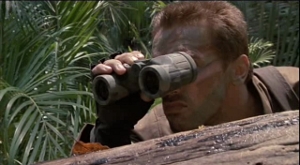 The 1980s saw a remasculization of American cinema. After long years languishing inside various genre ghettos (from sci-fi to vigilante to blaxploitation), the Action film took on a shambling semblance of life all its own. When you look at Westerns, Cop Dramas, or Spy Pics from the 60s and 70s, distinct hallmarks of their diverse genres remain apparent, intact. By 1982, with First Blood, we see these conventions reincarnated as a horrific Frankenstein of a thing, neither fish nor foul. A death mongering genre that dominated the Industry well into the 1990s, putting butts in seats worldwide with its fetish for explosions and ever-more-elaborate weaponry.
The 1980s saw a remasculization of American cinema. After long years languishing inside various genre ghettos (from sci-fi to vigilante to blaxploitation), the Action film took on a shambling semblance of life all its own. When you look at Westerns, Cop Dramas, or Spy Pics from the 60s and 70s, distinct hallmarks of their diverse genres remain apparent, intact. By 1982, with First Blood, we see these conventions reincarnated as a horrific Frankenstein of a thing, neither fish nor foul. A death mongering genre that dominated the Industry well into the 1990s, putting butts in seats worldwide with its fetish for explosions and ever-more-elaborate weaponry.